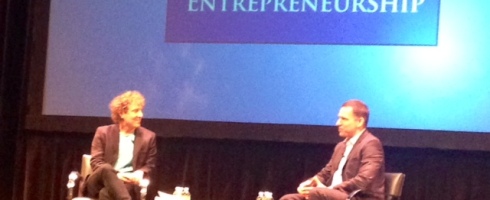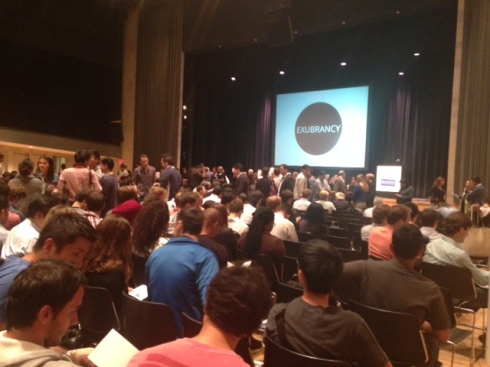[This was written for Office Lease Center’s blog]
Hours after PayPal co-founder Peter Thiel provocatively proclaimed Twitter to be “run by potheads,” he kicked off the release of his new book at Columbia University. The entrepreneur, investor and author shared his “contrarian” ideas from Zero to One: Notes on Startups, or How to Build the Future on Wednesday, Sept. 19.
“Tell me something that’s true that almost nobody agrees with you on,” is one of Thiel’s favorite interview questions, he said, hinting at his innovative yet unconventional opinions and affinity for nonconformity.
It must work for Thiel, whose resume includes co-founding Palantir Technoliges, investing in Facebook back in 2004, and of course, co-founding the ecommerce site PayPal in 1998 and selling it to eBay four years later. Today Thiel manages Founders Fund, a Silicon Valley venture capital fund that he co-founded.
Thiel’s role as adjunct professor at Stanford University, his alma mater, ultimately led to his new book. He posted his class notes on the Internet and they became so popular, he used them to write Zero to One. He outlined the three main concepts in his book – the goal of every company should be to create a new monopoly, why we should explore and solve the unknown when no one else wants to, and the role of technology and innovation in future progress.
While most people think capitalism and competition are synonyms, Thiel believes they’re antonyms. Successful companies need to take majority stake of the market, which yes, is the dirty “m” word. We should not listen to our “powerful psychological” instincts that tell us to imitate each other rather than stand out alone in a monopoly, according to Thiel.
“It is because there’s always this sense that there is safety in crowds,” said Thiel. “Unlike Malcolm Gladwell I believe there’s no wisdom in crowds, I believe there’s generally only insanity to be found in crowds and . . . lots of competition.”
Companies can avoid competition and get closer to monopoly by having a real technical advantage that no one can replicate, solving a hard problem or enlisting a distribution or marketing strategy to scale quickly, Thiel said.
It’s also okay to start as the best in a small market, that’s how companies grow. Thiel used Facebook, which, in its early Harvard days, had a huge hold of the college market, as an example. Boston investors made a mistake fearing that, he said, when they didn’t invest.
There is also something to be said about the characteristics of CEOs like Mark Zuckerberg that lead them to creating solutions in niche areas. Facebook’s founder is infamous for having Asperger’s tendencies, which seems to be a beneficial trait. Thiel asks, what does that say about our society?
“Everyone who is socially adapted will quickly, almost subconsciously pick up on all these social cues and will be discouraged from thinking any of their original thoughts before they’re even fully formed,” said Thiel. “They will sense that the answers to that [contrarian] question are uncomfortable and shouldn’t be pursued and instead veer toward these hyper competitive tracks.”
Those who don’t worry about following certain norms can focus on solving what no one else is thinking about, Thiel said, which is what he ended up doing after a quarter-life crisis in his 20s. He left his hostile, competitive law firm and joined the late 90s tech boom in Silicon Valley.
When we stay on that safe, predictable track, we stunt innovation. The world’s mysteries are the most neglected but also the opportunity for innovation, Thiel said. His theory is that most people categorize things as conventional things everyone understands or “mysteries” that we leave for someone else to solve or write off as impossible to figure out. The “in-between stuff” is answerable, but it’s harder.
“The people who believe that there are secrets, who believe that there are things to discover, are the people that go look for them and will find them,” said Thiel. “The people who believe that there are none, that everything’s already been solved, will not even try.”
He denounces the term “developed world.” The way we talk about our world results in what happens, and we don’t want to foster stagnancy. He asks, “How can we develop the developed world?”
To Thiel, technology and globalization hold the answers. Tech stimulates “zero to one,” vertical progress. Globalization replicates what works to expand for horizontal growth.
In his Q&A with Shane Snow, journalist and Contently founder, Thiel got a bit more candid.
“In Silicon Valley, don’t wear a suit,” said Thiel. “It looks like you’re bad at sales and worse at tech.”
He also said a strong, longtime partnership beats partners that had some tangential run-ins at networking events and decided to start a business together.
“Sounds like, ‘I just got married to the first person I met in Vegas,’” said Thiel.
As for the future of startups, he sees opportunity for growth in energy and biomedical research, especially the study of aging. But of course, entrepreneurs need to find their own mysteries to solve to hit the monopoly jackpot.



